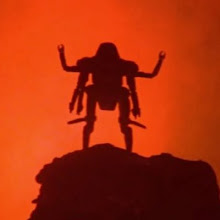 Not too long ago, the Sci-Fi Channel aired reruns of the short-lived series John Doe, starring Prison Break's Dominic Purcell as amnesiac who remembers nothing - nothing - about his personal life but seems to know every bit of recorded academic knowledge. The ultimate example of "book smarts," he knows all there is to know about geography, history, botany, forensics, et cetera, but nothing about his own life before he awoke one morning on an island off the coast of Washington State. Here's how Wikipedia described the gist of the program, which originally aired during the 2002-2003 season:
Not too long ago, the Sci-Fi Channel aired reruns of the short-lived series John Doe, starring Prison Break's Dominic Purcell as amnesiac who remembers nothing - nothing - about his personal life but seems to know every bit of recorded academic knowledge. The ultimate example of "book smarts," he knows all there is to know about geography, history, botany, forensics, et cetera, but nothing about his own life before he awoke one morning on an island off the coast of Washington State. Here's how Wikipedia described the gist of the program, which originally aired during the 2002-2003 season:A mysterious man wakes up on an island off the coast of Seattle, Washington, naked, with absolutely no memory of who he is or how he got there. However, apart from the details of his own past, "John Doe", as he comes to call himself, seems to have access to the sum total of all human knowledge: he knows how many dimples are on the surface of a golfball , the population of Uruguay, and other such obscure (and not-so-obscure) facts. He also has expert knowledge on everything from the stock market to computer science. Over the course of the series John attempts to find clues about his past by using his unusual ability while also helping people in need. In the process it becomes clear that an international conspiracy known as the Phoenix Organization is watching John's every move.Big mistake. I only made it through three episodes. In a show where the main character knows all human knowledge save for that about his own identity, how many challenges can you really place in front of that character before it becomes quite tiresome? The answer: two airings (plus a third out of pity).
Rather than adopt seriality as its mechanism for storytelling, the program devolved into a silly, episodic approach, with each airing featuring Doe assisting the police solve a new crime each week. Thus, it was a weak procedural with a sci-fi twist, not an unpopular approach these days with shows like Moonlight or even Journeyman on the air. Vexing is the fact that the writers of the program appear to know nothing about criminal procedure. (I suppose it's a hassle when the character you have created and must write literally knows far, far more than you, the writer.). I mean, really, if you are going to invest your time and energy and money into writing and producing a television show in which police officers play a substantial role, shouldn't you make at least some feeble attempt to learn what police officers do and do not do? Wouldn't it be in your narrative interest to do some modicum of research? Apparently not.
Further, the characters, save for Doe, spend most of their time attempting to sound clever or postmodern and meaningful in that way that only people created by television writers do.
The question you may be asking yourself is, what did I expect from a canceled show being rerun on the Sci-Fi Channel, of all networks? Good question. I have found some level of faith in the network since it began airing the excellent, excellent Battlestar Galactica (a fine narrative drama which may suffer some, in the eyes of mainstream television viewers, because it is called Battlestar Galactica.). Plus, in the spot that Sci-Fi has been airing Joe Doe, it had originally aired reruns of Firefly, the canceled Joss Whedon sci-fi/western, which while sometimes whimsical and routinely overpraised by Whedon's many online sycophants, was quite good. (Whedon and his entourage are also writers whose characters talk in that overly clever, self referential way in which no one truly does in real life, but the pay-off for repeat viewing of his television programs is so great that it is worth it.). So, with that context, I figured, why not give John Doe a try?
William Forsythe, who plays "Digger," the friendly sage of a barkeep, is usually a good performer (although perhaps I should have been leery of a program with a character calling himself "Digger"). Sprague Grayden, the actress who plays the flighty sidekick to Doe, actually gave some very interesting performances in Over There, the short-lived Iraq drama in which she played the wife of a wounded soldier. (She would later be written out of the post-apocalyptic network program Jericho.). Plus, as aforementioned, Purcell is on the once but no longer interesting Prison Break. But, alas, the writing, and the cast's apparent unwillingness to transcend the material put in front of them, doomed this series five years ago.





No comments:
Post a Comment